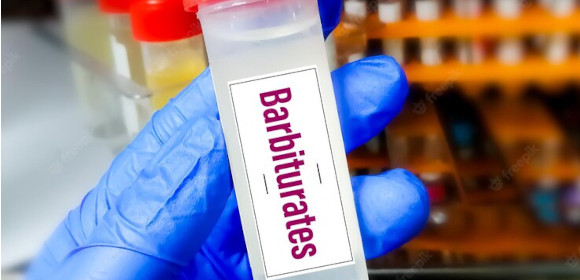What is the primary use of barbiturates in medicine?
Antibiotics
Antidepressants
Sedatives and hypnotics
Pain relievers


There are medicines that can treat insomnia or sleep disorders like nembutal and duinal. These two medicines are examples of barbiturates, which now have limited production and distribution.
Barbiturates are a type of drug that people categorize as sedative-hypnotics, which have an effect on the person’s physiology and psychology. The strengths and weaknesses of this type of medicine are very numerous. Due to the addicting nature of barbiturates, which means that producers will limit their production of barbiturates.
Barbiturates have many causes and effects due to the way the medicine will interact with the brain. Unlike Nyquil and other melatonin supplements, doctors don’t primarily prescribe barbiturates for people who lack sleep. Many Consumers should be careful in consuming this type of medicine and ask people to conduct observations on their behavior and physiology. Be sure to not engage in activities that will lead to the consumption of alcohol, as barbituates and alcohol do not mix.
Barbiturates interact with the metabolic rate of the brain, which causes this organ to slow down its energy absorption and usage. This will then not only cause lethargy and drowsiness in the body, but it will impede specific hormones in the brain which will psychologically affect your mood and perceptions.
Due to the effect of barbiturates on the brain’s metabolic rate, it can slow the brain down to a point where a coma can be induced. This is very important as brain surgeries may require the person to be in an induced coma to maximize the patient’s safety during the whole operation.
Barbiturates allow the person to experience a feeling of euphoria and lethargy, which can cause an increase of specific hormones in the brain like oxytocin. These hormones can induce addiction and dependence. Due to the way the brain adapts, the effects of barbiturates fall off faster the more the person uses them. This could lead to a higher dependence and increased usage of barbiturates.
Like all drugs and vices, when a person suddenly stops using barbiturates they will experience withdrawals. The symptoms of withdrawal can range from tremors, depression, anxiety, paranoia, skin rash, nausea, and convulsion. In some cases, withdrawals can lead to death or loss of inhibition.
Barbiturates are a category of medicine or drugs that can relax the body by reducing one’s heart rate and blood pressure. Not only do barbiturates lowers those biological factors, but they are also known to act similarly to relaxants and have similar effects to sleeping pills and alcohol. All of these factors can lead to a person having a drug-induced coma and even death.
Overuse of barbiturates can intoxicate a person with barbiturate related side-effects that will intoxicate a person. Barbiturate intoxication has side effects that are similar to alcohol intoxication, some of which are altered perception, going in and out of consciousness, lack of balance, and slow heartbeat.
Barbiturates slow down and reduce the brain’s central activity. This will slow down the brain’s processing speed and metabolic rate, which can relax the body and help put the person to sleep. This allows the barbiturate to prevent and minimize seizure attacks, induce sleep, and anesthetize the body.
Barbiturates are a type of medicine that can relax the body and prevent epileptic and non-epileptic seizures from occurring. The production and distribution of barbiturates are controlled and limited, which causes barbiturates to be rare commodities or products. Barbiturates are very dangerous if taken without any doctor’s service prescriptions. Overuse and hoarding of barbiturates are very alarming social issues due to their addictive properties which is another social issue in today’s modern culture.
Text prompt
Add Tone
10 Examples of Public speaking
20 Examples of Gas lighting
What is the primary use of barbiturates in medicine?
Antibiotics
Antidepressants
Sedatives and hypnotics
Pain relievers
Which of the following is a common effect of barbiturate use?
Increased alertness
Elevated heart rate
Sedation
Increased blood pressure
What is a major risk associated with barbiturate overdose?
Heart attack
Respiratory depression
Liver damage
Kidney failure
Which class of drugs is often considered as an alternative to barbiturates for their sedative effects?
Benzodiazepines
Antihistamines
Antipsychotics
Antibiotics
How do barbiturates primarily exert their effects on the central nervous system?
By increasing neurotransmitter levels
By blocking neurotransmitter receptors
By enhancing the effect of gamma-aminobutyric acid (GABA)
By inhibiting enzyme activity
Which of the following is a common barbiturate used for medical purposes?
Diazepam
Phenobarbital
Lorazepam
Alprazolam
What is a significant concern when using barbiturates long-term?
Development of tolerance
Increased energy levels
Improved cognitive function
Enhanced immune response
Which of the following is a possible withdrawal symptom from barbiturates?
Euphoria
Insomnia
Increased appetite
Lower blood pressure
Barbiturates are generally classified into which category based on their duration of action?
Short-acting, intermediate-acting, and long-acting
Immediate-release and extended-release
Fast-acting and slow-acting
Over-the-counter and prescription
What is a common method for managing barbiturate overdose?
Administering activated charcoal
Increasing fluid intake
Using diuretics
Performing surgery
Before you leave, take our quick quiz to enhance your learning!

